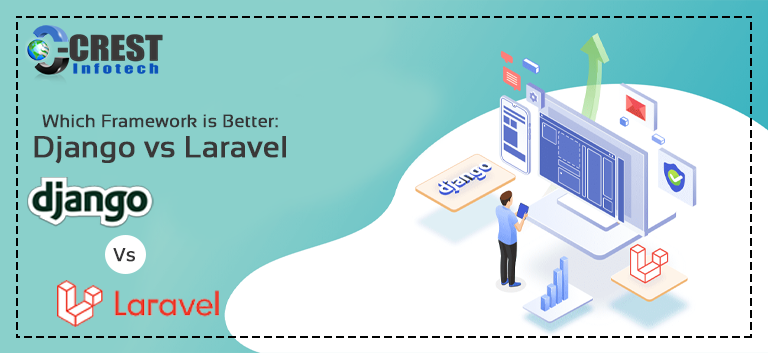Excellence is built on the basis of well-informed decisions! We all know this, nor do we really do it?
Not at all! Now that you know that your website is the only way to grow your company online, do you do extensive research before deciding on a web development tool to use to create it? Not many people will lift their hands to say that they do.
Why aren’t you comparing the quality and price of various web development systems before developing your website, just as you wouldn’t buy groceries before comparing the quality and price of different vendors?
So, today, let’s compare the two most common web development frameworks: Laravel and Django. With the in-depth comparison, you’ll be able to choose the best structure for expanding your scope.
What is Laravel?
Taylor Otwell prompted Laravel in 2011 with the most upscale traffic-related features. Because of its Model View Control architecture, Laravel creation is proficient and simple when compared to other CMSs. The superior quality functions and numerous inbuilt features of Laravel quickly drew the attention of developers.
We always tell our clients at Protocloud that if they want to build their web applications quickly and securely, they can invest in our Laravel development services.
Key Features of Laravel
- Lots of libraries and modules
- Artisan control support
- Offers authentication
- Has an innovative template engine
- Strong ORM support
- MVC architecture pattern
- Smooth migration process
- Easy unit testing
- High-end security
What is Django?
Django is a Python programming language-based open-source platform. It was created with the aim of creating complex and feature-rich website applications. It supports Model View Template architecture, unlike Laravel. It is well-liked by developers because of its lightweight features and reliable testing and development modules.
Django is an older application created by the Django Software Foundation in 2005, and it is used by a number of prominent websites such as Pinterest, Instagram, and others. Django is becoming a popular option among startups due to its easy development process.
Key Features of Django
- Well explained documentation
- SEO optimization feature
- Highly versatile framework
- Completely tested
- Python-based web framework
- Thoroughly scalable
- Superb security
- Fast development and deployment
Which Web Development Platform Should I Use: Laravel or Django?
If you’re torn between the Laravel Development and Django frameworks and can’t decide which is best for your new project, we can support by scaling both frameworks on the same platform.
Architectural Pattern
The object-oriented programming (OOP) and Model View Control (MVC) patterns are used to build aravel. Laravel is the 5th most common web development framework on GitHub, thanks to its strong architectural patterns. Django, on the other hand, is based on the MVT architecture pattern, making it the second most common programming language.
Coding Structure
If you’re a beginner developer, the Laravel framework can make coding more intuitive and simple for you. The security warnings make it simple to correct coding errors, which is especially useful for new coders. However, the Django coding framework is not for beginners; creating complex codes in Django needs a highly experienced programmer.
API Support
Since JSON queries are returned by default, one of the best things about Laravel is that it has built-in API support. As a result, you won’t have to deal with the headache of making APIs in Laravel. However, with Django, things aren’t so simple; you’ll have to navigate the library to create an API because Django doesn’t have any built-in API features.
Simplicity in Learning
Laravel is the perfect framework for new developers who are transitioning between languages. Laravel has an intuitive and steep learning curve that is simple to pick up. With Laravel, you can easily learn complicated processes like data mitigation, REST, ORM composer, and others. To master Laravel’s progress, there are numerous documents and community support available.
Consider for a moment that the learning curve for Python is zero. As a result, Django makes it simple to write and deploy code. Furthermore, Django’s code readability is very easy, allowing developers to easily read and write complex code.
Security Settings
Laravel is the perfect framework for new developers who are transitioning between languages. Laravel has an intuitive and steep learning curve that is simple to pick up. With Laravel, you can easily learn complicated processes like data mitigation, REST, ORM composer, and others. To master Laravel’s progress, there are numerous documents and community support available.
Django also adheres to some of the highest security practices. It prevents developers from making common mistakes that can compromise your web development process’s protection. Passwords, user accounts, cross-site request forgery, SQL injection, and click jacking are just a few of the security features provided by Django.
Popular Users
Several well-known online brands have also mastered the Laravel vs. Django debate. Mozilla, Instagram, Pinterest, Udemy, NASA, and other well-known companies have chosen Django’s diverse functionality. Laravel, on the other hand, has hosted several fantastic projects such as Swat.ul, 9GAG, Union, Razorpay, and others. In short, we have incredible live examples of both services to help you make an educated decision.
You can also Hire Dedicated Developer and Hire PHP Developer. Contact Crest Infotech to know more about Dedicated Development services in Details.



